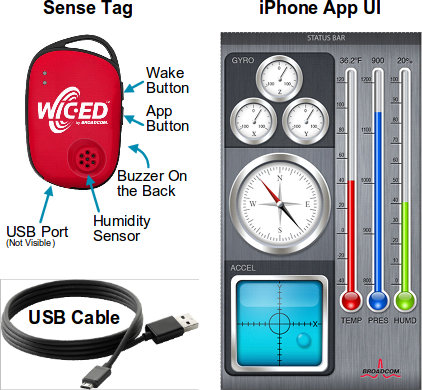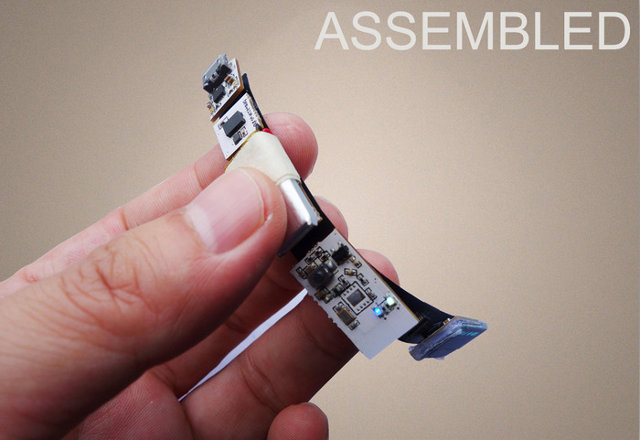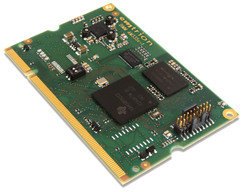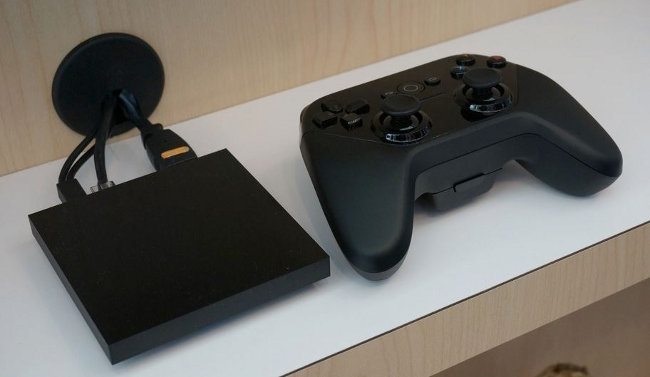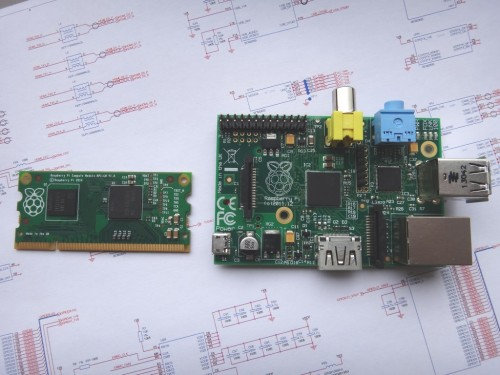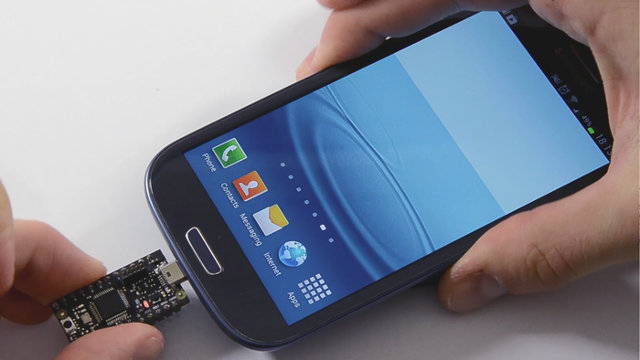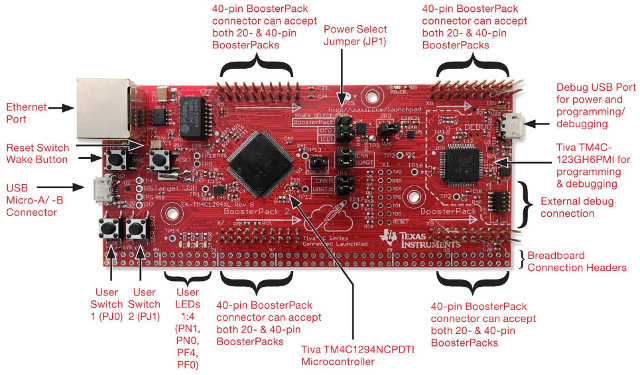Broadcom has recently announced a new development board for IoT applications using Bluetooth Low Energy (BLE) called WICED Sense. The kit consists of a “sense tag” powered by the company’s BCM20737S Bluetooth SIP Module with five micro-electromechanical sensors (MEMS), and Bluetooth 4.1 compatible WICED SMART software stack. The key features of WICED Sense devkit are as follows: Broadcom BCM20737 Bluetooth Smart system in package (SiP) module Five low-power MEMS sensors by ST Micro (part of the module): Gyroscope (L3GD20) Accelerometer (LIS3DSH) eCompass (LSM303D) Pressure sensor (LPS25H) Humidity Temperature sensor (HTS221) Bluetooth Smart connection covers distance of roughly 30 meters. USB – 1x micro USB connector to update applications Encryption, decryption, certificate signing, verification and various algorithms for increased privacy Secure Over-the-air (OTA) download capability to enable firmware updates from central device including smartphone, tablet and computers Misc – iBeacon, NFC, Wireless charging (Rezence A4WP) support. Power – Coin-cell battery The […]
MYIR ARM9 Linux Development Boards & Computer-on-Modules Powered by Freescale i.MX28 Processor
MYIR MYD-IMX28X development boards and MYC-IMX28X CPU modules had been announced in May 2014, but I’ve just found out about them via the company’s newsletter. The CoMs are powered by Freescale i.MX28 ARM9 processors (i.MX283 or i.MX287), feature 128 MB RAM, 256 MB Flash, and connect to a baseboard to make the development boards. Target applications include smart gateways, human-machine interfaces (HMIs), handheld devices, scanners, portable medical, experimental education as well as other industrial applications. MYC-IMX28X CoMs MYC-IMX28X computer-on-module specifications: Processor – Freescale i.MX283 or i.MX287 ARM926EJ-STM processor up to 454MHz with 128KB SRAM, 128KB ROM, 1280 bits of OCOTP ROM, 16KB/32KB I and D Cache System Memory – 128MB DDR2 SDRAM Storage – 256MB NAND flash, 128KB SPI flash Connectivity – On-board Ethernet PHY Connectors – 2x 1.27mm pitch 2 x 40-pin SMT male expansion connectors with access to Ethernet – Up to 2 Ethernet (two for i.MX287, one for i.MX283) USB […]
Vigekwear is a Modularized, Open source, Wearable BLE Development Kit (Crowdfunding)
[Update: Atomwear has been renamed to Vigekwear due to (Intel’s) copyrights infringement]. Giayee is a company mainly manufacturing Android tablets, thin clients, and mini PCs, but their latest product, called Atomwear, is a Bluetooth Low Energy (BLE) development kit based on Nordic nRF51822 chipset that comes with various modules such as battery charger, accelerometer, gyroscope, OLED display, heart rate monitor, etc… which connect together via 24-pin connector on a standard rigid baseboard or a flexible printed circuit (FPC). All modules are connected via the same 24-pin connector with power, I2C, SPI, UART, ADC, and GPIOs signals. The baseboard and FPC both contain 6 such connectors connected in parallel for up to 6 modules, and two baseboard can be connected together via a bridge circuit to accept more modules. The minimum configuration is with a BLE MCU module, and a power module. The different boards and modules are listed as follows: […]
Emtrion DIMM-AM335x SoM Supports Mainline Linux Kernel
When I cover system-on-modules (SoM), companies will usually provide some BSP (Board Support Packages) for older kernels, and did not submit their changes to mailine kernel, so I was interested in a news from Emtrion entitled “DIMM-AM335x: Linux mainline support ready“, which actually means they’ve done the work to support a recent Linux kernel (3.14) and provides instructions and code (device tree files), but did not submit patches to the linux-arm-kernel mailing list to get their changes added to kernel.org. Let’s look at the hardware specs first: SoC – Texas Instruments Sitara AM335x ARM Cortex A8 processor @ 720Mhz to 1GHz (AM3354 or AM3359) System Memory – onboard 512 MB SDRAM/optional 256 MB Storage – 512 MB NAND Flash (managed) + 2 SD card interfaces Display – LCDs I/F with resolution up to SVGA, with 4-wire touch interface Audio – Analog Audio with SSI I/F USB – USB 2.0 Host […]
ADT-1 Google’s Android TV Developer’s Kit Details
Google announced Android TV a few days ago, and distributed ADT-1 hardware development kit to application developers during Google I/O. I could not find much details at the time, except it was powered by Nvidia Tegra processors. I’ve now noticed some developers have posted a few pictures and the device, Phandroid has posted the specifications, and I’ve found some interesting hardware limitations for Android TV decided by Google that kill some potential applications for the TV. Here are known hardware specifications for ADT-1 devkit: SoC – Nvidia Tegra 4 System Memory – 2GB RAM Storage – 16GB flash Video Output – HDMI Connectivity – Ethernet, 2×2 MIMO dual-channel WiFi, Bluetooth 4.0 USB – 1x USB host port, 1x micro (custom?) USB port for power and ADB (via an Y cable provided with the kit) Dimensions – Small 🙂 This Android L Android TV box looks tiny and comes with G1 […]
Raspberry Pi Compute Module is a $30 Raspberry Pi Compatible System-on-Module
Albeit the initial goal of the Raspberry Pi board was to address computer science education, it has become extremely popular with hobbyists, has made its way in many different kinds of hardware, and is now clearly the number 1 low cost ARM Linux development board. The Raspberry Pi foundation has then decided to design and sell a system-on-module called Raspberry Pi Compute that people can use in actual products. Since the module will be mostly software compatible with the original Raspberry Pi board, the specs are similar: SoC – Broadcom BCM2835 ARM 11 processor @ 700 MHz with Videocore IV GPU System Memory – 512MB RAM Storage – 4GB eMMC Flash SoM Connector – DDR2 200-pins SODIMM Dimensions – 67.6x30mm board which fits into a standard DDR2 SODIMM connector The main difference is they’ve replaced the SD card slot found in the board, by an eMMC module which is more […]
USB2Go ARM Cortex M3 Development Board for Android Smartphones (Crowdfunding)
Many MCU based development boards such as Arduino or mbed platform connect to a computer via USB for power and programming, at least during the development stage. USB2Go, however, is designed with a micro USB port to connect directly to your Android smartphone, although it can also be used for standalone project, and an Arduino compatible baseboard is also available. This board powered by an STM32 ARM Cortex M3 MCU is however mainly destined to interface hardware such as LED, servos, sensors to your smartphone via micro USB providing both power and a communication channel with your Android device. USB2Go hardware specifications: MCU – STMicro STM32 ARM Cortex M3 MCU @ 72 MHz with 128 KB Flash, 64 KB SRAM USB – Micro USB for power and programming Headers – 2x 12 pin headers giving access to GPIO, ADC, PWM, UART, I2C, SPI… Debugging I/F – JTAG 20-pin to SWD […]
Texas Instruments Tiva C Series TM4C1294 Connected Launchpad Sells for $20
There are now many ultra low cost MCU development kit selling for $15 to $25 such as STMicro Discovery Board, but for this price, they’ll usually just feature the MCU, a micro USB, pin header, maybe and maybe some sensors, and they usually lack any form of connectivity, at least without extra hardware. With Tiva C Series TM4C129 Connect Launchpad, Texas Instruments brings a board that can be used for IoT application out of the box thanks to the addition of an Ethernet port. The board sells for just $19.99, which means you could easily make something like a connected 4-relay control system for about $25. Connected LaunchPad evaluation kit specifications: MCU – Texas Instruents TM4C1294NCPDT ARM Cortex-M4 @ 120MHz with floating point, 1MB Flash, 256KB SRAM, 6KB EEPROM, Integrated 10/100 Ethernet MAC+PHY, data protection hardware, 8x 32-bit timers, dual 12-bit 2MSPS ADCs, motion control PWMs, USB H/D/O, and many […]


